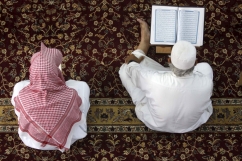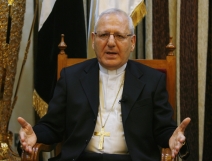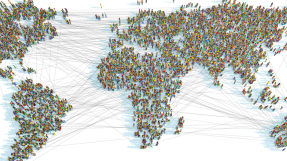Nearly three million Muslims in the UK and many more around the world are preparing to end their month-long fast of Ramadan this week.
Cries of "Eid Mubarak" will ring around social media and Muslim communities and the celebrations begin. The festival is known as Eid al-Fitr and translates as the festival of the breaking of the fast.
Here is a guide of all you need to know:
What is Eid al-Fitr?
The celebration marks the end of the Islamic holy month of Ramadan. The ninth month in Muslims' lunar calendar, it is believed to be the month when Muhammed first started receiving the Qur'an.
During this month Muslims will go without food and water from sunrise to sunset. This year in the UK Ramadan has fallen over the summer equinox so Muslims have had to fast for up to 18 hours each day.
Eid al-Fitr is the festival to mark the end of this ritual and is one of the most important celebrations in the Islamic year.
A number of Muslim countries mark Eid with public holidays. In Saudi Arabia and Qatar, there is an 11-day Eid public holiday. In the UAE, Bangladesh and Turkey, they have a nine-day holiday and in Oman they have five days, in Pakistan, four.
When is Eid al-Fitr observed?
It is often hard to tell when the party will begin because Ramadan is based on the lunar cycle.
Technically the fast is over when Muslims catch the first glimpse of the new moon in the sky, marking the beginning of the next month of Shawwal. Although some wait until they have seen the new moon themselves, many will judge it based on the calculated time in their country or by the declaration from Saudi Arabia.
Because it is lunar based, countries celebrate Eid al-Fitr at different times. In the UK, USA and Canada, Eid al-Fitr will be celebrated over three days on the 6<sup>th, 7<sup>th, 8<sup>th July.
What is the difference between Eid al-Fitr and Eid al-Adha?
There are two major "Eids" in the Islamic calendar. The word in Arabic means "festival" or "celebration".
The other is Eid al-Adha, also known as the festival of the sacrifice. This marks the end of Hajj, the Islamic pilgrimage which is another crucial tenet to the Islamic life.
Eid al-Adha celebrates Ibrahim's willingness to sacrifice his son. The story is similiar to the biblical story of Abraham being prepared to offer Isaac. In both the biblical and the Qu'ranic account, God stops Abraham / Ibrahim from sacrificing his son and provides a ram to kill instead. However in the Qu'ran, the son is Ishmael, not Isaac, as Muslims believe Ishmael is the son of promise.
What do Muslims do on Eid al-Fitr?
The first day of Eid al-Fitr is the one day of the Islamic year that Muslims cannot fast on. Typically this is marked with a small sweet breakfast such as a date before the special Eid prayers known as Salat al-Eid.
Otherwise the day is marked by an obligatory donation to charity and celebrations with family and friends. They share gifts, meals and sweets and see the time as a time to thank Allah for helping them to complete their fast.
They also see it as a time of forgiveness and making amends with each other. They greet each other with: "Eid Mubarak". This roughly translates as "happy Eid" or "blessed Eid".
Should Christians wish 'Eid Mubarak'?
Should Christians should join in the wishes of "Eid Mubarak" with their Muslim friends and colleagues?
The Archbishop of Canterbury tweeted a message of "prayer and affection" to Muslims around the world last year, much to the horror of some Christians.
But fear not. By wishing "Eid Mubarak", Welby is not suddenly renouncing his belief in Christ as the son of God. In the same way that Christians appreciate it when Muslims say "Happy Christmas", it is simply a mark of respect and love.















